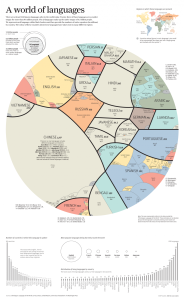“[T]he whole Hong Kong society [has] forced [children] to think since their childhood that English is high class, is superior … If you are not at a school taught in English, you are a second-class student.” – Claudia Mo Man-ching

The EF EPI is the world’s largest ranking of countries by English skills. The fifth edition ranks 70 countries based on test data from 910,000 English language learners.
English is lauded as the language of globalization that inspires hope for a future where a common language can be used to solve common issues that plague the planet. This has led to the language acquiring a privileged status in the arena of global education – an English language education is considered to be a core requirement of a globalized curriculum. It is no surprise, therefore, that Education First (EF), an organization working on providing “life-changing education for global citizens,” released its Fifth Annual English Proficiency Index (EPI) on November 3, 2015. The “world’s English mania” has been quantified, the results are in and Sweden is the winner.
At the same time as Sweden celebrates regaining “the crown” of English proficiency, however, Hong Kong’s consistent drop in the ranking has raised grave concerns over the “stratification” of English education under the government’s focus on mother-tongue teaching.
Power Corrupts, but does English Corrupt Absolutely?
The world has often been divided into binaries: Global North/South; developed/developing; First/Second/Third World. To these, we now add the dichotomy between English proficiency/incompetency. The EPI situates Sweden and Hong Kong in these two different camps, but without giving any importance to context. Europe’s colonial and Asia’s colonized past are not taken into consideration. Instead, regional and global averages are discussed – statistics which not only ignore social and cultural contexts, but also gloss over key differences in English proficiency within countries.
The EPI situates Sweden and Hong Kong in these two different camps, but without giving any importance to context. Europe’s colonial and Asia’s colonized past are not taken into consideration. Instead, regional and global averages are discussed – statistics which not only ignore social and cultural contexts, but also gloss over key differences in English proficiency within countries.
Both the report’s exclusive focus on English and the  reactions it has elicited (joy from Sweden and dismay from Hong Kong) represent the world as increasingly monolingual. In this way, reports such as the EPI perpetuate the position of English as a dominant language – they contribute to and increase the hype around English and its importance to the global world, while silencing other languages. It is ironic how an organization such as EF which claims to work on “international language literacy” produces statistics only on English proficiency.
reactions it has elicited (joy from Sweden and dismay from Hong Kong) represent the world as increasingly monolingual. In this way, reports such as the EPI perpetuate the position of English as a dominant language – they contribute to and increase the hype around English and its importance to the global world, while silencing other languages. It is ironic how an organization such as EF which claims to work on “international language literacy” produces statistics only on English proficiency.
English Competency = Economic Competitiveness: Can we measure everything?

While the report has always focused on the connection between a country’s English skills and its economic competitiveness, this year’s report is unique in its analysis of the (positive) relationship between English proficiency and innovation achievements (measured through metrics such as technology exports and research and development expenditure). Underlying the report, therefore, are assumptions about English being a core competency in the global economy. In this way, the EPI reproduces dominant ideas about the superiority of English by linking it directly to an increase in economic development.
For me, then, the EPI is a shameless advertisement for English. The subtext is: Come learn English and you will become modern, developed and rich!
But what if I want to be modern, developed, rich and an Urdu speaker? Does that make me less global?
Sources
Education First (2014, November 19). EF English Proficiency Index – EPI [Video file]. Retrieved from https://www.youtube.com/watch?v=HDa-UMK8-6w
Education First. (2015). English Proficiency Index. Retrieved from http://www.ef.edu/epi/
Phillipson, R. (1992). Linguistic imperialism. Oxford: Oxford University Press.
PR Newswire. (2015). Sweden at Top, Middle East at Bottom of EF’s Global Ranking of English Skills [News release]. Retrieved from http://www.prnewswire.com/news-releases/sweden-at-top-middle-east-at-bottom-of-efs-global-ranking-of-english-skills-539730692.html
The Local,. (2015, November 3). Swedes regain crown as top English speakers. Retrieved from http://www.thelocal.se/20151103/swedes-regain-crown-as-top-english-speakers
Walker, Jay (2013, March 1). The world’s English mania [Video file]. Retrieved from https://www.youtube.com/watch?v=ZpILR21GWao
Zhao, S., & Zhou, L. (2015, November 3). ‘Mother-tongue teaching policy to blame’ as Hong Kong slides down English proficiency index for second year in a row. South China Morning Post. Retrieved from http://www.scmp.com/news/hong-kong/education-community/article/1875254/mother-tongue-teaching-policy-blame-hong-kong

It’s unbelievable the extent to which English dominates every corner of the world. It’s true, countries take pride in their English proficiencies and there is too little emphasis on preserving existing languages. My mom is from Bhutan, it’s a small country, but it has a lot of linguistic diversity. It’s common for grandmother’s generation to speak at least 5 languages and now I have cousins that barely speak two, mostly only wanting to speak English. It’s shocking how quickly things have changed!
LikeLiked by 1 person
You bring about a very thought-provoking topic, Neha. In China’s job market, at least from what I know, understanding English is surely a privilege. Many of my friends graduated as Chinese – English translators and interpreters. Language is the door to culture, that’s the good part. The not so good part is that we can be easily exposed to only one culture when English is the dominate foreign language in many parts of the world.
LikeLike